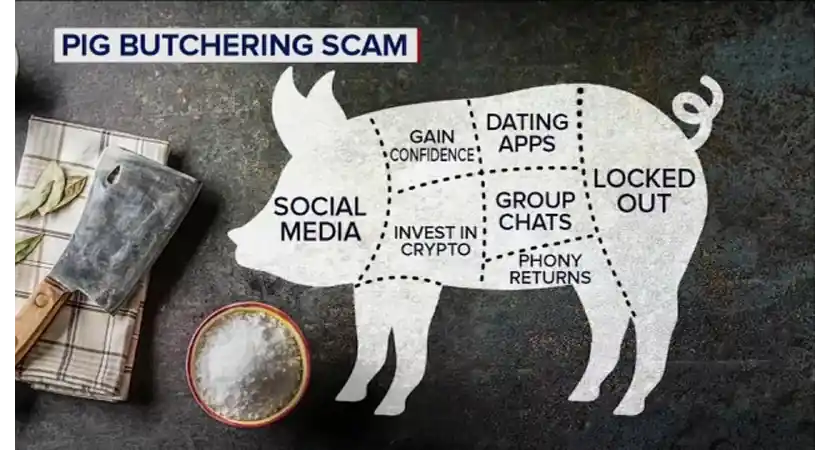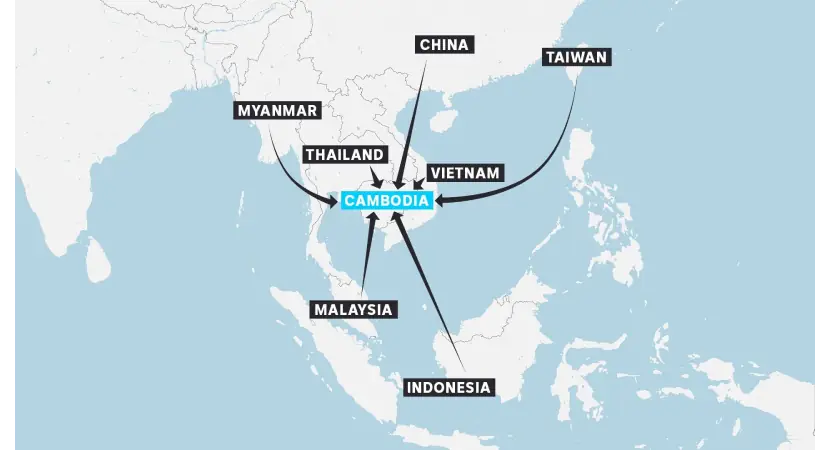Have you ever been scrolling online, whether it be Facebook, Instagram, Twitter, or, if you're feeling very frisky, Tinder or Bumble, and you come across something that is almost too good to be true? Well, you're certainly not the only one. Just last week, a Nigerian Prince contacted me through Gmail, and it turns out he had lost his Credit Card information and desperately needed some emergency funds to fuel his private jet. Luckily, being the tech-savvy individual I am, I was able to figure out that it was a scam email and that he had probably sent the very same message to thousands of others in the hopes of skimming funds from even just a handful of those people, luckier for me, I figured this out after sending him only $600,, what a close call that was! With the internet being the way it is, and us all having the anonymity we do when online, it's hard for us to know whether people are who they say they are, and in some cases, whether they are located where they say they are. In the case of my prince, I was lucky that I only lost $600, for some people, the scam can be much more costly than that. One of the more common examples of these online scams is the Cambodia Pig Butchering crypto scam, which deceives people from around the world with high-paying fake job offers, promising paid flights and visas, only to kidnap them upon arrival in Cambodia. The victims are held captive in a compound controlled by organised crime groups and are eventually forced to scam others through various methods, such as romance and investment schemes.
Many of these scammers tend to be located around Southeast Asian countries for different reasons, and the most common are:
- Lower average income - In Cambodia, for example, the average monthly wage is only $500 which is not enough to sustain a household.
- Corrupt police and legal system - The police department is ranked as the most corrupt branch in the Cambodian government, while also lacking the power to fully investigate and prosecute corruption in the country due to lack of legislation.
- Large number of English speakers - Southeast Asian countries like Singapore, Thailand, the Philippines, India and Cambodia all have large English-speaking populations. This works to the advantage of scammers, since most of their targets are also English speakers.
Why is Cambodia at the Forefront of These Centers?
Cambodia, the small South East Asian country with a population of 17 million, bordering Thailand, Vietnam and Laos, tends to be at the center of many of these scams. The Cambodian government plays a large part its being used for these scam centers and considered highly corrupt and has been run by Hun Manet since 2023, the son of the previous prime minister, Hun Sen, who was in power from 1985 to 2023. The government is a de facto dictatorship, with Chinese communist Party-style influence, and they have a king who serves as a showpiece head of state, but it is generally understood that the prime minister, Hun Manet, is the one who holds power. They are also heavily influenced by Chinese foreign nationals, and many of these scam centers tend to be run by wealthy Chinese or Cambodian citizens. The Chinese government has been making some serious efforts over the past 5 years to shut down these scam centers, which is why many of the Chinese foreign nationals run the centers through Cambodia, where the government provides a more tolerant approach to them.
Since 2023, Cambodia’s government has been making pseudo efforts to close the centers, with a few smaller ‘token’ centers closed down and around 2000-3000 individuals freed. These efforts are usually in response to foreign governments pressuring Cambodia regarding citizens being trafficked. To help put this figure into context even more, Cambodia currently has around 100,000 individuals who have been illegally trafficked into the country to work in these centers, and it would take around 100 years to free every person working in these centers at the current rate the Cambodian government is working. The cold, hard truth is that the centers are closely linked to the Cambodian parliament and the prime minister Hun Manet, so until this changes, the centers will never truly be closed down.
Inside the Scams and the Scars Left Behind
Some of the first-hand accounts of how people get tricked by these crypto pig butchering scams shed a dim light on the world of those who are trafficked to take part in the scams and also those who are affected by the scams through intimidation, manipulation and financial theft. On April 23rd 2025, a 23-year-old Vietnamese man escaped from one of these centers in Cambodia's Koh Kong province. He immediately went to the police and informed them of what was happening in the building, and that he was being forced to work daily from 5:30 pm until 11 am, every day of the week. The officer he spoke to said it was nearly impossible to do anything. The police knew what was happening in the compound, but to act on their information and infiltrate the building, they needed special permission from the interior minister of Cambodia, as the building is believed to be owned by a Cambodian senator, Ly Yong Phat, one of the wealthiest men in Cambodia and a close personal friend to the prime minister Hun Manet. Boy, I sure do wonder how he built up all that wealth of his. The more you dive into the crypto scams in Cambodia, the more you keep circling back to the Cambodian ruling family and the website they own, where many of these scams originate from, the online marketplace Huione. I guess it doesn't pay to close down the scam sites when the scam sites are the ones paying you. It turns out there's a lot of money to be made when you exploit the labour of the working class *cough cough* late-stage capitalism, anyone? Apologies, my cough has been bad this week. This Huione website operates like a darknet marketplace in Southeast Asia, and is paired with another app connected to the Hun family, the Huione International Payments, which is implicit in laundering the scam money.
Vanessa, an Australian woman who was approached by one of these well-equipped scammers when trying to learn Mandarin in the summer of 2022, was pressured into adding this person who claimed to be from Hong Kong on WhatsApp. They talked for three weeks, and in her words, “He'd talk about his morning run, they'd share photos of food they were eating, he'd speak to her in Chinese, and – sprinkled throughout their chat history but never the main focus – cryptocurrency investments.” This ‘long con’ is where the scam gets its name from. The idea behind it is to fatten up the animal before slaughter, or in the case of this crypto scam, to gain the target’s trust with consistent communication and sometimes affection. Then, when the target is ‘fattened’ up, the scammer usually encourages the target to download fake investment apps, which is where our Cambodian ruling families' little investment side pieces come into play once more.

The different branches of the Pig Butchering Scam
Where are Scam Centers Located in Cambodia?
Now that we know a little bit more about the political situation in Cambodia and why these centers tend to be so common there, you're probably wondering to yourself, where are scam centers located in Cambodia? The centers in Cambodia tend to be localised mostly in the regions of Phnom Penh - the capital city of Cambodia, Kandal, Pursat, Koh Kong, Bavet, Preah Sihanouk - an island province in Cambodia, Oddar Meanchey, Svay Rieng and most famously Sihanoukville. These provinces all tend to share some similarities, mainly being that they are all in relatively close proximity to Phnom Penh, likely for ease of access to individuals who are trafficked directly into Cambodia. Also, each of these provinces shares a border with either Thailand or Vietnam, where many of the people who are scammed into working at the centers are flown into and then trafficked across the border. They then have compounds set up to house those trafficked in, to work illegally.

Cambodia’s Geographical location and the surrounding countries most commonly targeted for trafficking
The Reality of the Cambodia human trafficking scam centers and those being forced to Work There
The more you research and the more you look into the political situation in Cambodia, the more you begin to see the truth of the Cambodia human trafficking scam centers, which are being used to run crypto scams on victims, and are being operated by 100,000 individuals who were either trafficked in or sold through human trafficking rings, run by criminal organisations. This is a frightening figure when put into context. It is a greater population than 13 of the world's 197 countries, quite literally being held captive in Cambodia. These people are essentially under the stewardship of the Cambodian government. At least other countries hide behind the veil of equality, am I right, Putin? It would almost be admirable if it weren't so truly evil. The work and conditions for those being held captive are just as frightening and sad to read about as the scams that are being played out on innocent bystanders. The work is long and hard, from accounts of those who have escaped. They are usually forced to work 16-18 hour days, 7 days a week and are living in substandard conditions with cramped sleeping spaces, shared with the other captives. Windows are covered in protective bars to avoid escape, and the walls of the compounds have barbed wire attached to them. There have also been reports of the captives being beaten for refusing to work and sold to other scam centers, or in severe cases, being sold on the black market for their organs, if they are not earning enough through their scams.

What if your workplace became your prison cell?
The Shocking Story of a Filipino Who Chooses to Scam
While living in Southeast Asia, specifically the Philippines, for two years, I met several individuals who had worked at these centers by choice. Now it's important to remember, I'm discussing the Philippines here, and the reality of Cambodia is a different one, where most people are being held against their will. I can recall, even now, a day when I had a conversation with a taxi driver in Metro Manila about his previous involvement. I remember he was telling me of the times he had been scammed by customers while driving his taxi in Manila, a semi-regular occurrence for him. He joked during our conversation about this being ‘karma’ for his previous involvement with the scam centers, and I was immediately intrigued, so I probed him for more information. He told me how he had worked for them for over a year, and he had taken up the work when he felt he had nothing else he could do that would generate him a similar amount of money. It's interesting because I remember feeling at the time that he talked about this so openly, like it was no big deal, or that he was justified in what he did.
I bring this story up now, because I believe it shows the other side to these centers, the one not many discuss, and that is that a smaller percentage of people working for them are there by choice. They justify working there as a kind of great equaliser for being born in a third-world country or for having fewer opportunities in life than others. They think it's only fair to scam those from wealthier countries, because they have more. I don't write this to attack those who think this way, but instead to shed some light on it and the reality of the views around the centers by those who work there voluntarily. I also met countless people who despised these centers while travelling in Asia and were extremely vocal in their views of the people who work there. The vast majority in Asia dislike them just as much as everyone else. Another reality I heard of when living in the Philippines was those who are tricked into working at the centers with vague job listings. It is very common for these centers to exist in the Philippines as well as Cambodia, as there is a large English-speaking workforce there who are very well accustomed to customer service jobs. When writing this, I messaged a Filipino friend of mine, and her account of events in the Philippines went along the lines of - Not many of these people are forced to work there, they are instead lured in under false pretences and then convinced to work there with the high wages and easier working environment as opposed to a lot of other jobs in the Philippines.
What are the methods used by Cambodia scam centers to steal cryptocurrency?
I believe the old saying, experience is the best teacher in life, is an accurate one, and in this case, even more. The best way to avoid these scams is to be familiar with how they work. Let's take a look at What are the methods used by Cambodia scam centers to steal cryptocurrency. Initially, the person who is trying to scam you will always first try to earn your trust. Whether they do this with romance, friendship, or by creating some common ground that you share with them, they will make sure that you feel they are on your side, before you ever get a sense that they want something from you. Sometimes this can take them days, weeks or even years, but the key to all of these scams is for you to believe what they are saying and trust them. For the Cambodia Pig Butchering crypto scam, the method usually involves a combination of catfishing, investment and romance scams. Afterwards is where our old friend, the Cambodian prime minister, Mr Hun Manet and the Huione website and international payment platforms come into play again. The scammer will slowly drip into everyday conversation small crumbs of information about their trading and success. The key to this scam is that they initially don't ask you for money, which makes it harder to spot. They talk to you daily, invest time into making you feel seen and heard, and they share details about their life and what they do and updates about their daily activities like any friend, partner or romantic interest would do. They make you feel safe talking to them, whilst slowly getting you more and more interested in their trading endeavours.
The scammer will slowly ramp up the intensity with time, and eventually, the way the scam is supposed to unfold, is that the person being lured in will become so intrigued by the scammers trading and money making methods, that they will ask or will be encouraged by the scammer to download these ‘trading platforms’. In reality, these platforms are fake investment tools, set up to steal money from the investors who download them, with the investors sometimes even being able to withdraw funds from the website to make it appear more reliable. When the scam website does finally steal the money from the investor, the money taken needs to be ‘cleaned’, which is where the Huione group's platform comes into play. Huione is an established firm which does legitimate business, and they have a big presence in Southeast Asian countries, with their app being commonly used as a payment method in Cambodia. The issue is that some of the affiliates of the Huoine group are used as a front for money laundering, with one affiliate of the Huoine group openly running an online marketplace for criminals to launder money. This branch is linked to $26.8 billion in cryptocurrency transactions in the past 4 years, which makes it hard to differentiate between legitimate and dirty money when the organisation is mixing it all together, and you have a government backing your shady business.

The Huione Group hiding behind the veil of legitimacy
How to Spot These Scams
Always remember, if something seems too good to be true, it probably is. These scams rely on people's desire for quick money, but nothing in life is ever free (unless you're a tyrannical, money-hungry billionaire who exploits the labour of the working class to keep generating your wealth). But hey, that's an article for a different day. The best way to avoid these scams is to be on the lookout for certain signs. As always, we at Plasbit care about your well-being, so we wanted to let you know about some signs worth noticing.
- Always approach things in life with a healthy dose of skepticism. Why are they giving you this information? Why, if it were this easy, wouldn't everyone be doing it? The moment we start to question these scammers and look at the story they are telling you, is the moment it all starts to collapse under the weight of its own Bullshit, pardon my language.
- The scammers' contact usually begins with an unsolicited message, which is why you should always be wary of random profiles messaging you on dating apps or social media. Again, ask yourself why this person is reaching out and what they could be looking for by sending you unsolicited messages through social media.
- The scammer will usually have a sense of urgency in their message, especially when they have introduced you to the scam, and they will usually want you to invest quickly, to avoid you talking to others, so remember, every big decision in life is one you should take time to think over, and legitimate investment opportunities don't usually require a rushed decision.
- The scammer will usually offer large rewards for your investment and will usually be quick to show you how much they are making and what they have been buying with their earnings.
In the End, It’s Not Just Money They Take
Now that we have looked at the Cambodia Pig Butchering crypto scam, why it is so common in Cambodia, and looked more in-depth at the Huione group, I believe it's fair to say that this is one of the more complex scams that we have discussed on Plasbit. It involves over 100,000 captive prisoners, a shady organisation and a system of lies and deceit that runs as deep as the Prime Minister of Cambodia. The scam is complex and involves multiple layers, but underneath it all lies a sad truth about the world today. These scams thrive because of an environment of loneliness and desperation that surrounds us all. Whether that is us wanting more money, friends or romantic interest, these scams play on our desire for more. Let's all take a moment to appreciate what we have. And remember, if something seems too good to be true, it probably is.







